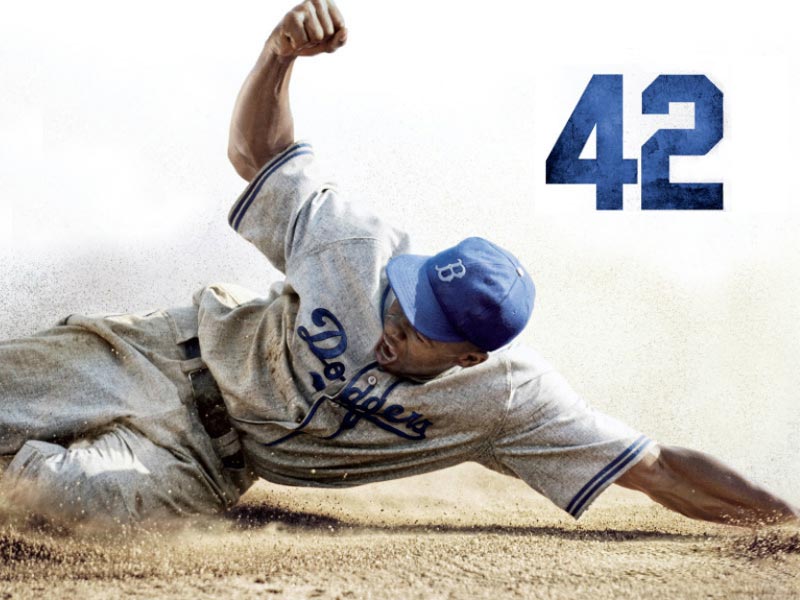I was hesitant in going to see “42” because I thought it would be another super sappy “Disneyed” bio pic. I wasn’t looking forward to sitting through that. After all, my first memory of doing a report on a character in history was Jackie Robinson. I still have the Dodgers jersey I wore that day (it was big at the time). Writer-Director Brian Helgeland delivers a solid homerun in the film that covers Jackie Robinson’s heroic tale of breaking Major League Baseball’s color barrier.
Part of the problem that I have with films that show African American’s struggle in history is that it generally plays out as a victory blessed by a white person. Brooklyn Dodgers General Manager Branch Rickey (Harrison Ford) was undoubtedly the one who made the decision to bring Jackie Robinson (Chadwick Boseman) to the Major Leagues. Yet the film admits that a part of Rickey’s decision was based on money. It’s honest moments like that in the depiction that makes the movie.
The film covers from Rickey’s search for a negro player to the Dodgers win of the National League Penant in 1949. Ford seems to have fun in his old age playing the gravel voiced Rickey. He brings an enjoyable campy style to the character who pulled a gutsy move in bringing the first African American into the Majors.
Although a 128 minute running time could never cover the totality of everything the real Jackie Robinson endured, one of the most powerful scenes in the film is when Philadelphia Philies Manager played by Alan Tudyk uses everything in the racial slur handbook against Robinson. The scene is uncomfortable, but authentic and Boseman does a great job of showing the weight of racial prejudice and restraint that many African American pioneers had to possess in order to successfully open doors for others. Ultimately drawing back on a quote from Harrison Ford’s Branch Rickey the movie gives its audience the reason Jackie Robinson’s legacy should be respected.
Symbolism is big in this film. Robinson’s number 42 jersey becomes a symbol of change. A baseball thrown to a young boy by Robinson becomes a symbol of hope. Another memorable scene in the film is when Pee Wee Reese (Lucas Black) famously puts his arm around Robinson to show the world he too is accepting change.
Some of the writing is on the nose, it’s the characters that really go beyond what the script calls for to make this film great. Boseman’ depiction of Robinson is a magnificent performance due to his natural reserve. He nails the air of self confidence, wit, and charm that Robinson had to have in order to endure. They say behind every great man is a great woman, and Nicole Beharie as Rachel Robinson was another great choice with just as much innate restraint to bring a refreshing embodiment of the hero’s better half to the screen. The film becomes as much about telling Rachel’s story due to Beharie’s contribution.
I enjoyed the film, and so did the audience I saw it with. Jackie Robinson’s story is one that should be told, especially to new generations that live in a totally different world from the 1940’s. It’s worth remembering and celebrating. It’s a good choice in paying your hard earned money to see a film on the big screen. “42” in theaters now.
B




